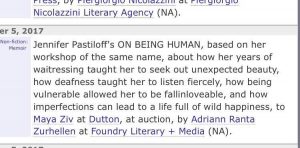By Susan Moshofsky
I birthed my second pregnancy into a toilet. Cramps came in waves, crested, doubled me over until I’d hunch my way from my bed where I’d been grading papers to the bathroom a few feet away where, bare feet on the cold linoleum floor, I sat and turned the toilet water red. I bled fetus, tissue, death, 12 weeks of anticipation, trip after trip, bed to toilet: bright red blood filling the bowl, plus a shaggy clot or two, every other trip. Flush and repeat.
The OB’s office said they were sorry, there was nothing they could do. Don’t exert yourself. Take ibuprofen. Lie down. Don’t soak more than a pad an hour, or you’ll have to come in.
This, then, became my task: do this right, this miscarriage. Oh, and grade 164 essays in between trips to the toilet. Quarter grades were due in two days. Two deadlines. Dead lines. I’d wait as long as I could, lying on the bed while I graded so as not to overexert. I lay next to my husband as he kept me company reading Annie Dillard’s The Living.
I’d mark a few papers, then feel the trickle of blood ooze between my legs. Blood began to pool, then slowly fill my crotch, my underwear, the pad. Check the clock. Fifty-five minutes since the last trip. Another five, and I could let myself get up and walk to the toilet. As soon as I stood up, the pooled blood trickled, sometimes gushing down my legs before I could get there.
Each trip, I lifted my ass to peer into the bowl to see if there was anything besides blood and shaggy clots in there.
What would I see? A walnut-sized fetus? A doll-like shard of hand? Or foot? Or head?
How to lose a pregnancy, redux
I survived my second pregnancy loss by swimming every morning before work. Slipping into the water where it was quiet, sounds around the pool muffled, I felt like something prehistoric, gliding from one end of the pool to the other, each morning’s swim a watery burial for my grief. I longed to disappear, never come back up for air. It wasn’t that I wanted to kill myself. That would have required too much energy. Swimming was easier.
I chose breaststroke because I only had to surface briefly. On the long glides, I yearned to stay below until I couldn’t feel the sorrow anymore.
And then I’d see the clock and realize I had to get out of the pool. I had to get to work. I lifted myself out, my body so heavy, extra pregnancy weight still cruelly hanging on. I toweled off as I walked to the locker room, conscious of the water still beading on my feet. I hurried to dress and hurried to school, my hair nearly always dripping wet as I walked into my classroom. One morning I’d forgotten my underwear, so I had to wear my still-wet bathing suit under my clothes that day. I didn’t care.
It happened on Thanksgiving, a day I now hate. Brett and I had just sat down to the traditional feast together with my parents; our five-year-old daughter, Rachel; my sister, and her children. I started to feel some cramping. It’s just gas, I thought. I rubbed my belly, trying to ignore the next cramp, and took a bite of mashed potatoes.
This pregnancy was so different from the one lost a few months earlier that year. “A good sign,” my doctor had smiled when I complained about the nausea this time.
Another cramp made me set down my fork. Maybe this baby was just extra active. Wasn’t four months about when babies started kicking in utero?
I excused myself, got up from the table, and walked down the hall to the bathroom, biting my lip until I could taste the blood.
With each step to the bathroom, I remembered the last miscarriage. The trickle of blood that led to torrents and shaggy clots. Hours of clots. And emptiness. All the way to the toilet now, I dreaded finding bloodstains in my underwear. I’d been nervous throughout this pregnancy, but at my last appointment, the OB had listened carefully, stethoscope pressed to my belly, then smiled.
“A strong heartbeat,” she’d pronounced. “You can tell your daughter. Your friends. And let the school know since you’re due May 17, before the school year’s over.” So, after three months spent barely breathing, afraid to tell anyone until my doctor’s reassurance, we’d told our families. My school. Our daughter. She’d curled into a fetal position in Brett’s lap as she listened.
And now, here in the bathroom, there was blood in my underwear. No clots, like before, but bright, red blood, an oddly symmetrical Rorschach pattern. I peered closer, squinted at the oval shape. Tendrils of blood laced the edges. I held my belly, pushing to see if I could prompt some movement, a kick that would reassure me. Nothing. I quickly pulled up my pants. I stared at my reflection in the mirror as I washed my hands. What did this mean? There shouldn’t be any bleeding at four months, right? We’d heard the heartbeat this time. My hands shook as I dried them on the towel. I sucked in a deep breath before returning to the table.
“Anything wrong?” Brett whispered, leaning closer as I sat down.
I shook my head no and picked up my fork again. I’d read that some women spotted throughout their pregnancies and went on to deliver healthy babies. But was “spotting” bright red blood, or just rusty stains? Another cramp hit, and this time, I dropped my fork. Heard it clatter on the floor.
“Sue, are you okay?” Brett said aloud this time.
I pushed my chair back.
“I’m okay, just going to lie down,” I said to everyone at the table. “I’m tired.” I didn’t want to explain and make my fears real. And I didn’t want to let Rachel know anything was wrong. Her sixth birthday was just a week away. I’d been too sad at the last loss, too foolish not to hide it, so she’d taken it hard, too. What if she had to watch me grieve another?
Brett followed me to the basement. I whispered, “I’m bleeding.”
His eyes widened. “I’m calling the doctor.” He stepped around the corner to make the call.
I lay on the couch, eyes closed, willing these cramps away, willing the blood to coagulate, visualizing it swimming its way back up my vagina, into the uterus, where it belonged, part of the protective layer around my baby, the layer that should not be leaking right now.
Fifteen minutes later, he brought me the phone. He’d gotten the answering service, but the doctor had called right back. Though my regular OB wasn’t available, her partner was on the other end. She listened to my symptoms, then took in a breath.
“Probably nothing, but for peace of mind, let’s do an ultrasound. We’ll hear the heartbeat, and you can go back home and finish your Thanksgiving dinner. Meet me at the office in half an hour. Drink at least two glasses of water on your way. We need a full belly to get a good view of your baby.”
Our baby. Will we get to hold this one?
We asked my parents if Rachel could stay for a sleepover with her cousins. The children jumped up and down, squealing and giggling as we slipped out the door.
Brett and I were silent all the way to the doctor’s office. It felt strange to enter via the hospital; the physicians’ office entrance was closed for the holiday. We passed through dim hallways already decorated for Christmas, yet even those lights were dark.
When we met my OB’s petite, quiet partner, her dark hair cut in a neat bob, I wished for my tall, lanky, grey-haired doctor, whose smile and easy manner were so reassuring.
“Drink some more water, change into this gown, and I’ll be back in a minute,” she directed after ushering us into a room.
I gulped three more glasses, then became so nauseous I had to run across the hall to the bathroom to vomit. I didn’t even care that the back of my gown was open, exposing everything.
The doctor guided the ultrasound wand across my belly, further distended from the liquid I had kept down. Watching the ultrasound monitor, she made no eye contact with either of us. She paused, then pushed harder, grinding the wand so hard I felt my bladder would burst.
She lifted the wand for a moment, then removed her glasses and squinted, drawing closer to the small screen, silent. She stood, flipped on another bank of lights, then sat down, replaced her glasses, and started over, this time pushing even harder. What’s wrong? I thought. Why isn’t she saying anything? After a few more hard swipes, she set the wand back in its holster. Adjusting her glasses, she stood, shoving her hands in the pockets of her white coat.
“This equipment is a little primitive,” she explained. “I can’t get a good read on the heartbeat, but that’s probably because your baby isn’t in quite the right position.” She was looking at the wand, the monitor, anywhere but our eyes. “Let’s have you go downstairs to the hospital ultrasound, and we’ll get some reassurance. They’ll send you back up here with the report, and we’ll talk. Drink some more water to help make the baby easier to see.” Her white coattails floated behind her as she left the room.
My hands shook harder now as I changed back into my clothes, gulping two glasses of water, then a third as we rode the elevator down. I held Brett’s hand tightly, willing the nausea away. I wanted to vomit out the worry, the anxious thoughts that something was wrong. But I’d have duct-taped my mouth shut if keeping that liquid down would help us see this baby.
I couldn’t speak. If I said anything, I’d make the worries real.
“It’ll be okay, Sue,” Brett whispered as we followed the signs to the Radiology department.
The technician was a young, unblinking woman with dark hair and large-framed glasses with slightly concave lenses that made her eyes look enormous. She snapped on a pair of gloves and grabbed the container of clear, conductive gel to smear across my belly. She didn’t even give the usual “cold to the touch” warning, so I flinched when she applied the gel. She grabbed the ultrasound wand and guided it across my girth. This machine was much larger than the one in my OB’s office, and the screen was as big as a TV, but it was angled toward the technician, so I couldn’t see a thing. Brett stood behind and to her left, so he could watch. All I could see was his face, brows knitted, eyes trained on the screen.
“Found the heartbeat yet?” my husband asked after a few minutes.
There was a long pause, and I realized I was holding my breath.
Another pause.
“There is no heartbeat,” she said.
“What?” Brett and I blurted together.
“No heartbeat.”
When neither of us replied, she said it again. “There’s no heartbeat. None.”
“Are you sure?” Brett asked.
“Yes, look here,” she said, pointing the screen more toward him while I looked at the ceiling, noting an odd pattern in the white tiles. I started counting the dots, trying to determine if each tile had the same number. Twenty-six on the one directly above me. Twenty-four on the one to the left. But that couldn’t be right. They were all identical. Anyone could see that. I must have lost count.
“But my wife is four months along,” Brett was saying.
I felt like I was floating, up closer to the ceiling tiles. Twenty-six for sure on each.
“There must be something we can do. Surgery?” His problem-solving, engineering side was coming out now. “I mean, aren’t there babies born at 21, 22 weeks who survive?” The technician just blinked at him, her brown eyes like moons. “We’re only four and a half weeks away from that,” he continued. “Surely we could do something to keep the baby alive until then…”
He isn’t making sense. She just said the baby is dead. Then his usually deep, loud voice trailed off, growing softer and softer. I strained to hear him.
Soon, I couldn’t hear anything. Brett and the technician seemed so far away. I was somewhere outside my body, up near the ceiling, counting all those dots.
My husband and the ultrasound tech were pointing at the black and white screen. Brett was gesturing, his voice a whisper now, tears on his cheeks, and the tech was wiping the wand clean, putting it back in its holster, taking off her gloves, wiping her hands.
There was a long pause, and I remembered Rachel. What would we tell her? I could feel my body, heavy on the table again. My cheeks were wet. I found my voice. “Let me see.”
The tech turned the screen toward my face. A small, ghostly figure floated in the middle of the black and white screen. Silent. Still.
There wasn’t anything to say. I lay on that table, tears running down my face.
After the insertion of laminaria (seaweed sticks to dilate my cervix and induce labor), after the hospital procedure to remove the baby (because “we don’t want you to have to go through labor; that would be cruel”), after they put me partially under and removed my dead baby, and after they wheeled me, just me, out of that bright, echoing room, and after I asked whether it was a boy or girl, and the doctor said, “It was just tissue,” and after I slept for about a week, I packed goodie bags and made a cake and gave a birthday party for our daughter, now six.
And after that, I swam. Every morning. For a year.
Susan Vaughan Moshofsky is a mother of three, an educator, and a writer. Some of her recent work has appeared in Grown and Flown, Brain, Child Magazine, and Huffington Post. Her Brain, Child essay, “The Boob Tube,” was nominated for a Pushcart Prize. She has studied with Lidia Yuknavitch, Jennifer Pastiloff, and Kim Stafford.

Donate to the Aleksander Fund today. Click the photo read about Julia, who lost her baby, and what the fund is.






No Comments